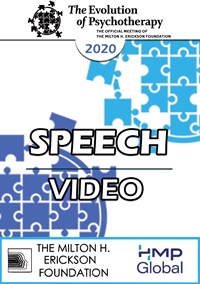EP20 Speech 07 - Doing Imago Therapy in the Space Between - Harville Hendrix, PhD; Helen LaKelly Hunt, PhD
- Average Rating:
- Not yet rated
- Topic Areas:
- Couples Therapy | Speeches | IMAGO | Gender Dynamics | Feminism
- Categories:
- Evolution of Psychotherapy | Evolution of Psychotherapy 2020 | Pioneers in Couples and Family Therapy
- Faculty:
- Harville Hendrix, PhD | Helen LaKelly Hunt, PhD
- Course Levels:
- Master Degree or Higher in Health-Related Field
- Duration:
- 1 hour
- Format:
- Audio and Video
- Original Program Date:
- Dec 12, 2020
- License:
- Never Expires.
Description
Description: This presentation covers the fundamentals of creating conscious partnerships using Imago Relationship Therapy. Key practices include structured dialog, zero negativity, empathy, and daily affirmations. The approach helps couples replace conflict with curiosity, understand past experiences, and build emotional safety. The session also highlights how early life influences shape relationships and how consistent communication practices support lasting change through neuroplasticity.
Syllabus Description: Since life is lived in the Space-Between and remembered in Space-Within, thus giving birth to subjectivity, therapeutic intervention should be directed to the Space-Between in order to effect change in the Space-Within. This radical shift from subjectivity to the interactive space calls for a radical revision of therapeutic interventions. This speech will describe the problem and discuss the impact of relational interventions.
Educational Objectives:
- Describe the difference between the Individual Paradigm and the Relational Paradigm
- Identity ways to practice the Imago Dialogue
- Teach the Imago Dialogue to others
*Sessions may be edited for content and to preserve confidentiality*
Credits
Handouts
| Doing Imago Therapy in the Space Between (488.5 MB) | Available after Purchase | ||
| Timestamped Transcript (1.1 MB) | 28 Pages | Available after Purchase |
| Ericksonian Learning Snapshot (243.5 KB) | 2 Pages | Available after Purchase |
Faculty

Harville Hendrix, PhD Related Seminars and Products
Harville Hendrix, PhD and Helen LaKelly Hunt, PhD are partners in life and work. Their lives and work are integrated in their commitment to the transformation of couples and families and to the evolution of a relational culture that supports universal equality. Harville is co-creator of Imago Relationship Therapy and co-founder of Imago Relationships International. Chancellor of the Imago International Institute and emeritus board member of IRI. Dr. Hendrix has received an honorary Doctor of Humane Letters from Mercer University, Macon, GA, the Distinguished Service Award from the American Association of Pastoral Counselors, and the Distinguished Contributors Award by the Association for Imago Relationship Therapy. His latest book, written with his wife, Helen Hunt, is Receiving Love.

Helen LaKelly Hunt, PhD Related Seminars and Products
Harville Hendrix, PhD and Helen LaKelly Hunt, PhD are partners in life and work. Their lives and work are integrated in their commitment to the transformation of couples and families and to the evolution of a relational culture that supports universal equality.


